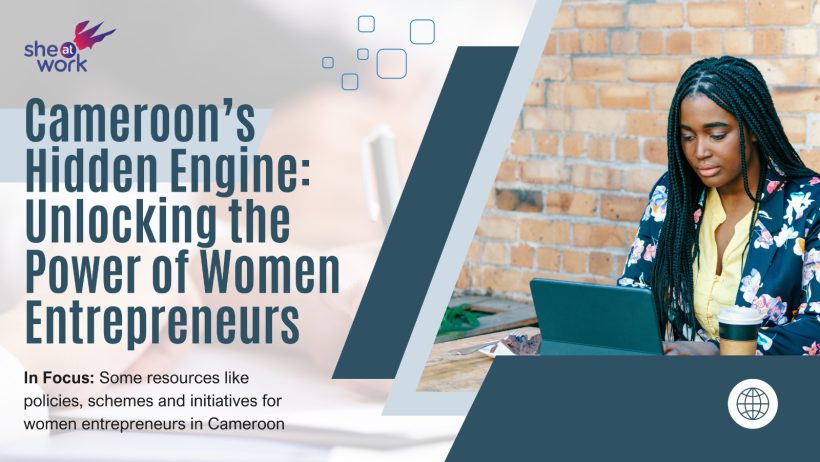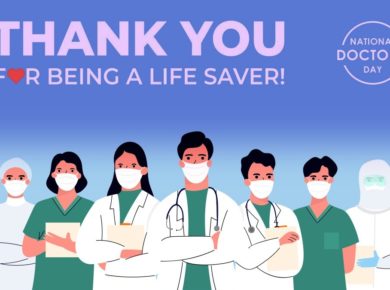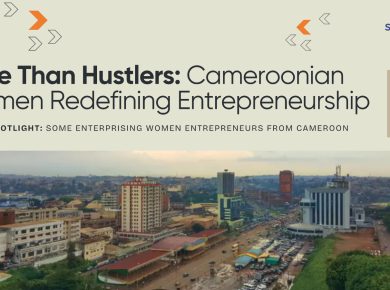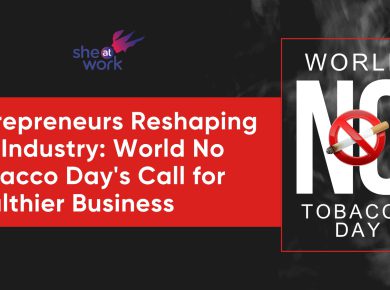In Focus: Some resources like policies, schemes and initiatives for women entrepreneurs in Cameroon
#ShePowersCameroon #WomenInBusinessCM #UnlockHerPotential #CameroonRise
In Cameroon, which is known as ‘The Hinge of Africa’ the potential for female-led economic growth is immense, where women make up over 50.5% of the population. Women play a pivotal role in sustaining communities – especially through agriculture, where they produce the majority of food consumed in urban areas. But, despite their contributions, many remain underserved when it comes to one of the most vital tools for business growth: access to credit.
Credit Where It’s Due: Fueling Women’s Business Dreams in Cameroon
Improving access to financial services for women is not just a matter of gender equality – it’s a strategic move toward national economic prosperity. When women are given the means to create and expand businesses, they generate income, create jobs, support families, and strengthen both the formal and informal sectors of the economy. Studies have shown that women in Cameroon already shoulder a significant share of family responsibilities, often contributing more consistently than men to household expenses. And yet, men still dominate income-generating opportunities due to disparities in credit access and business support.
Thankfully, this imbalance is beginning to shift. Initiatives such as Ecobank Cameroon’s Elevate program and the U.S.-backed Academy for Women Entrepreneurs (AWE) are opening new doors for women through funding, training & mentorship. These resources not only empower individual women but also contribute to the broader goals of poverty reduction, inclusive growth & national development too.
Here let us explore the tools, platforms, and policies that are helping Cameroonian women turn ideas into enterprises – and enterprises into engines of economic transformation.
> Ecobank Cameroon
One of the continent’s leading banking groups is the Ecobank Group. In Cameroon where 39% of the country’s 393,166 SMEs are run by women, Ecobank Cameroon is committed to promoting women entrepreneurship digitalisation, accessibility of services and SME financing. With its Ellevate programme launched in 2021, at least 1,600+ women entrepreneurs, businesses and associations have benefited directly from over $3 million in financial support.
In Cameroon, 39% of the country’s SMEs are run by women, but at the same time, these women entrepreneurs continue to face challenges such as limited access to finance. It was in response to this that Ecobank Cameroon launched the Ellevate programme in 2021, and subsequently opened the country’s first banking space for women-owned businesses in March 2024. It provides – financial support, training & mentorship to women entrepreneurs and businesses, with the aim of enabling them to upscale their skills and develop their businesses.
Ecobank is a real economic player not only in Cameroon, but across Africa, contributing to the customer experience in many ways. From its commitment to digital transformation, financial inclusion and women’s entrepreneurship, the bank received the prestigious Best Bank of the Year 2019 award from The Banker.
According to Ecobank Cameroon’s leaders, the new version of Ellevate, called “Ellevate 2.0” was launched in March 2024, in response to the success of the initial version. The idea is to expand the program to more beneficiaries and make it more inclusive and versatile; and it targets women in both the informal and formal sectors.
The programme aims to improve cash flow management, provide access to value-added services such as training, networking opportunities, and offer loans at favourable interest rates. According to Ecobank Cameroon, it gives access to financing with unsecured loans of up to $50,000.
This funding is especially important in a context where SMEs, particularly those owned by women, struggle to secure financing. According to World Bank studies and government data, women lead 23% of manufacturing SMEs in Cameroon, even though they make up 51% of the population. Broadly, they account for 38% of businesses in the country, with a strong presence in micro-enterprises (39%) and lower participation in large companies (14%).
https://africa24tv.com/cameroon-epromoting-women-entrepreneurship-over-usd-3-million-to-empower-women
> Academy for Women Entrepreneurs (AWE)
The US Embassy in Cameroon announced an open competition for organizations to submit applications to implement the 2025 Academy for Women Entrepreneurs (AWE) in Cameroon in December 2024. AWE is a US Department of State-led initiative around the globe to support gender equity and equality by promoting women’s economic opportunities and giving enterprising women the knowledge, networks & access they need to launch and scale successful businesses.
This programme, sponsored by the US Department of State, aims to promote economic prosperity – by creating opportunities for women entrepreneurs to launch and scale successful businesses. The AWE program in Cameroon focuses on – training, mentorship, advice & practical skills for women entrepreneurs, with a particular focus on social enterprises and businesses with export potential.
The AWE targets specific areas like product quality enhancement, export compliance, and US market entry strategies. The programme facilitates connections between women-led businesses and international markets, including the US.
What does it involve? They will provide a six-month training programme in the summer or fall of 2025 to train 50 women business owners in product quality enhancement, export compliance, and US market entry strategies. It will culminate in an “AWE Alumni Trade Fair and Export Forum.”
This targeted approach aims to create a pipeline of export-ready women-led businesses
in Cameroon.
https://simpler.grants.gov/opportunity/357681
> Women Entrepreneurship for Africa (WE4A) Programme
This programme is focused on empowering women eco-preneurs with green businesses or ideas, providing them with resources, mentorship, and networking opportunities.
> Women Entrepreneurs Finance Initiative (We-Fi)
This initiative provides funding for programs that boost women’s entrepreneurship, with a focus on benefiting women in low-income and conflict-affected countries.
We-Fi (Women Entrepreneurs Finance Initiative): We-Fi supports women entrepreneurs through various means:
– Expanding financial services: We-Fi works with banks, fintechs, and insurance companies to provide more accessible financial products and services for women-owned small and medium enterprises (WSMEs).
– Improving market access: We-Fi integrates WSMEs into domestic and international value chains and producer networks, and increases procurement opportunities.
– Strengthening entrepreneurial ecosystems: We-Fi champions gender-lens investing through funds, incubators, and accelerators, and provides direct investments in high-potential women entrepreneurs.
– Increasing equity finance: We-Fi supports the supply of equity finance for WSMEs at the pre-seed and seed stages.
– Digital financial inclusion: We-Fi supports WSMEs in expanding their operations through digital financial technologies.
> E4Impact Foundation
E4Impact Foundation supports the start-up and growth of new businesses in Africa through MBAs, Entrepreneurship programs, business accelerators and economic development projects.
It was launched in 2010 as initiative of ALTIS – Graduate School of Business and Society of Università Cattolica del Sacro Cuore. In 2015 it became a Foundation with the support of Associazione Genesi, Mapei, Webuild, the Università Cattolica del Sacro Cuore and Always Africa Association.
Later, Eni, Intesa Sanpaolo, Carvico, Montello, Confapi, Coldiretti and Filiera Italia, joined E4Impact as Corporate Participants and Diana Bracco, Michele Carpinelli e Mario Carlo Ferrario as Individual Participants.
Their vision is that by 2028 they will be running 10 national entrepreneurship centers and operating in more than 20 African countries – offering training, access to markets, and financing opportunities, thus becoming a leading force in the creation and growth of impact enterprises on the Continent.
https://e4impact.org/francesco-piccinini-empowering-women-entrepreneurs-in-
cameroon/
> The WONDER Project
The WONDER Project, is a startup acceleration initiative providing training courses on business growth strategies and corporate finance, exclusively for Cameroonian women entrepreneurs. The objective was to help them launch and scale up their businesses and access financing too. The programme is promoted by the African Development Bank Group under the AFAWA initiative.
The WONDER investor readiness and business development accelerator programme is designed to build 30 formal women-led enterprises with special regard to their innovative potential, as well as to their social and environmental sustainability for the next one year.
This will be achieved by equipping them with – skills, knowledge & tools to optimize and refocus their businesses for growth and scale-up.
The impact of the project will be demonstrated through an innovative approach to improve African enterprises’ access to finance, and delivery of training/services to combine skills enhancement and business acceleration, and individual mentorship.
The WONDER program implemented in Kenya and Cameroon has been funded by the African Development Bank under the Affirmative Finance Action for Women in Africa (AFAWA) initiative.
The program aims to strengthen the capacity of 150 women entrepreneurs (90 – Kenya, 60 – Cameroon) through training, to enhance business productivity and growth, in a period of 3 years.
https://e4iaccelerator.org/Wonder/
> Training program for Women Entrepreneurs in the mining sector (P2FESM) in the eastern region of Cameroon
The training programme offered by S4ICE – aims to reduce gender inequalities and enhance the economic empowerment of 20 women in the artisanal mining sector in Cameroon. Participants will receive advanced training that will enable them to effectively manage their mining activities, access new markets, and maximize their income while adopting sustainable mining practices.
Women play a crucial role in the artisanal mining chain in Cameroon. However, they face a set of significant challenges -including stigma, a lack of practical technical skills in management, limited access to resources and markets, and precarious working conditions. By training them in entrepreneurship, this program aims to address these gaps, promote their economic independence, and encourage responsible mining practices.
This project aims to increase the participation and inclusion of young women in the exploration, exploitation, and marketing of mining products in Cameroon, specifically in the East region. It is an initiative that includes intensive programmes to equip participants with the necessary entrepreneurial knowledge to effectively engage in mining exploration, exploitation, and marketing. Additionally, it aims to provide them with relevant knowledge related to emerging information and communication technologies, artificial intelligence (AI), and securing mining sites.
The main desirable objectives for this programme are:
– Strengthening Women’s Skills: By training 20 women in basic entrepreneurial practices related to business management applied to the mining sector.
– Reducing income inequalities and enhancing women’s economic empowerment: Increase participants’ income by at least 70% during the first year following the training program.
– Providing women involved with knowledge of sustainable environmental practices: Encourage the adoption of environmentally friendly and health-conscious mining techniques.
Specifically, it involves providing skills to women that cover basic and technical mining operations, including extraction, processing, trading, safety, waste management, and the use of specialized equipment. Additionally, workshops will be organized to develop skills in project management, leadership, entrepreneurship, and communication. These skills will empower women to take on supervisory roles, lead their own businesses, or undertake community projects. Moreover, this programme aims to train 20 young women in specific technical skills related to geological and mining activities in a secure and sustainable manner.
This amounts to training:
– 05 entrepreneurs in the mining sector
– 05 in exploration professions: geotechnicians, miners
– 05 in transformation professions: tailors, jewelers
– 05 environmentalists: cultivators, nursery workers
> Cameroon’s Policies for Women Entrepreneurs
Cameroon’s policies for women entrepreneurs aim to address various challenges and promote their economic empowerment. These policies focus on enhancing access to finance, improving infrastructure, and promoting inclusive practices. The government, along with various organizations and initiatives, are working to support women in building and scaling sustainable businesses.
Key Policies and Initiatives:
Access to Finance
– Microfinance and Credit Programs: Initiatives like the Ellevate program at Bank Cameroon provide financial support to women entrepreneurs.
– Financial Inclusion: Efforts are made to encourage financial institutions to engage with women’s enterprises, particularly in rural areas, addressing the difficulty of accessing finance.
– Government Guarantees and Support: Government agencies are establishing to provide support, including financial backing, when necessary, to help women entrepreneurs.
– Networking and Partnerships: Facilitating the development of networks between female entrepreneurs, investors, and experienced mentors to provide guidance and resources.
Infrastructure Development
– Improving Telecommunication and Communication: Developing infrastructure in rural areas to facilitate the transport of agricultural products and connect rural businesses to urban centers.
– Promoting Digital Transformation: Leveraging technology to expand access to finance and improve the customer experience for women entrepreneurs.
Inclusive Policies and Practices
– Gender-Inclusive Policies: Encouraging women’s participation in policy-making and leadership roles within cooperatives and governmental boards, ensuring equitable resource allocation.
– Addressing Unpaid Care Work: Implementing social protection programs like subsidized childcare and flexible working arrangements to allow women entrepreneurs to manage family responsibilities and business activities.
– Strengthening the National Rural Development Policy: Making additional efforts to boost women’s contribution to economic growth through various stakeholders in the entrepreneurial ecosystem.
Skill Development and Training
– Up-skilling and Knowledge Transfer: Providing training and workshops to equip women with the necessary skills to build and scale sustainable businesses.
– Educational Programs: Promoting access to education and training that empower women, enabling them to accumulate assets or increase returns on existing assets.
Legal and Regulatory Reforms
– Simplifying Administrative Procedures: Easing legislation for businesses transitioning from the informal to formal sector, with specific measures for fast-tracking administrative procedures for women entrepreneurs.
– Promoting Women’s Rights: Implementing the new penal code to ensure better protection of women against violence and harassment and to address issues like early marriage.
Support Networks
– Business Incubators: Developing business incubators specialized in women’s entrepreneurship, particularly in rural areas.
– Networking and Platforms: Creating platforms for women entrepreneurs to connect with mentors and industry champions for guidance and support.
– Community Groups and Associations: Encouraging women entrepreneurs to join local community groups and associations where they can share experiences and access support.
> Developing women’s economic potential in Cameroon: call for interest
The British High Commission in Cameroon has announced in July 2024 an open call for interest from organisations to implement the 2024 Empowering Women Entrepreneurs in Cameroon programme.
The British High Commission is inviting proposals to design and implement an innovative training programme – to enhance capacity of women entrepreneurs across Cameroon. This initiative is geared to support women’s economic potential in business leadership by promoting women’s economic opportunities and giving enterprising women access to the knowledge, networks & platforms they need to launch and scale successful businesses.
Successful project proposals will harness the power of public-private sponsors, local partnerships, and UK alumni networks to help participating women and their business grow, driving localised prosperity.
Project outcomes:
– to enhance capacity and upskilling of women to deliver their economic potential
– to facilitate access to finance for women entrepreneurs
This project will run until 31 March 2025 and will focus on providing women entrepreneurs with access to vital resources and support, including 3 main phases.
> Other Funding Sources
– The International Finance Corporation (IFC) is partnering with Afriland First Bank to boost SME financing in Cameroon, including for women-led businesses.
– Organizations like the British High Commission also provide funding and support to Cameroonian organizations working with women entrepreneurs.
– The Association of Women Entrepreneurs of Karnataka (AWAKE) is an example of a non-profit organization that works to empower women through entrepreneurship development.
> Small Business and Entrepreneurship Center (SBEC)
Here’s a look at the future.
For Cameroon to be an emerging economy by 2035, and to foster a lasting peace, they must improve opportunities for women and young people. Incidentally, majority of whom work in informal SMEs, and face widespread disparities in freedom of economic access in a context of complex and costly regulatory processes; difficulty to access credit and capital; and lack of requisite soft skills for business.
Funding support from Templeton would augment committed support for the Small Business and Entrepreneurship Center (SBEC), which aims to create a more robust and diverse middle class in Cameroon through fostering free enterprise. Specifically, it would underwrite an advocacy campaign with the coalition of stakeholders – to promote economic freedom, while at the same time, also deepening roots for SBEC as a go-to resource for entrepreneurial training and development. Along with measurable policy improvement, training programmes and SME support across 4 regions will result in $3M+ new economic generation; 600+ SMEs improved; and 4500+ workers (75% women and youth) with entrepreneurial soft skills.
To accomplish these, the project will undertake the following main activities:
i) Advocacy campaign with a coalition of stakeholders to change policy for more favorable conditions for starting and maintaining businesses;
ii) Develop human capital for small business owners, focusing on young entrepreneurs and women; and
iii) Conduct job-preparedness Boot Camps.










